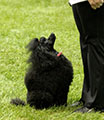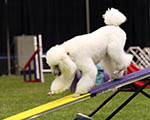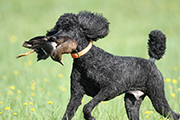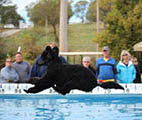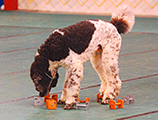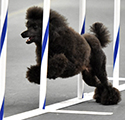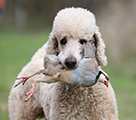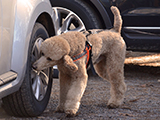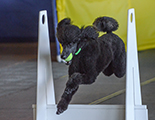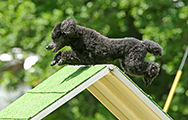Poodle Dental Care
Good dental care for your Poodle helps promote a healthy body. Dogs can develop gingivitis and periodontal disease just as humans can. The bacteria present in periodontal disease can travel from the mouth through the bloodstream and cause infections in the liver, heart, and other major organs. Such an infection can become life-threatening. A Poodle with periodontal disease may show outward signs such as bad breath, flinching while having her muzzle clipped, the inability to carry something in her mouth or difficulty eating. Periodontal disease is painful for the dog.
Home dental care can help prevent dental problems. It only takes 24 to 48 hours for plaque to begin to turn to tartar, so the key to preventing dental problems is daily brushing. As with caring for the Poodle’s ears, there are various ways to care for the Poodle’s teeth.
When you have a puppy whose permanent teeth have not yet erupted, begin to accustom your pup to having her teeth and gums rubbed and massaged. Hold your pup in a comfortable position for the puppy, and use your index finger to gently rub the teeth and along the gum lines. Do this often and make it a pleasant experience for the puppy. This training need not last longer than a few moments.
As you train your puppy to accept a finger in her mouth, keep an eye on the adult teeth as they begin to come in. If baby teeth are not coming out as adult teeth are coming in, take your puppy to the vet without delay. A retained baby tooth can create a bad bite because the permanent tooth is unable to take the proper spot in the jaw which is already filled by the baby tooth.
If you have an older dog that is not accustomed to having her gums rubbed, follow the same procedure as above, taking care to make the Poodle comfortable so the training is pleasant.
The puppy will soon learn to accept a finger in her mouth. Once they willingly accept a finger in the mouth, slowly begin to introduce the pup to a very soft toothbrush. There are various toothbrushes available for dogs. Check to see which might be suitable for your pup, or experiment. The human Reach toothbrushes have a slight bend at the neck, which makes them easy to use with a Standard Poodle. For Toy and Miniature Poodles, some have found that a finger brush, dental sponge, or dental pad works better to get into a small mouth. However, it is preferable to use a brush since the brushing action provides the real benefit. For Toy and Miniature Poodles, a soft, child-sized toothbrush, such as the Oral-B, may fit well in their smaller mouths. If your dog is comfortable with a toothbrush, you may wish to try one of the battery-powered toothbrushes because it provides a soft, rotary action.
Only use toothpaste manufactured for dogs. Human toothpaste will leave an unpleasant taste in your dog’s mouth and swallowing the toothpaste may cause stomach upset. There are many brands of canine toothpaste on the market. These may be found at your local pet supply store, at online retailers, or at your veterinarian’s office. As a precaution, you may want to ask your vet to review the ingredients in any toothpaste you use. Canine toothpastes are flavored to encourage acceptance by dogs. To acquaint your dog to the taste of the toothpaste, put some on your finger and let her lick it off. Then, put some of the toothpaste on your index finger, a gauze pad or cloth and gently massage your dog’s teeth and gums to accustom her to the paste in her mouth.
If you are beginning a dental care regimen for an older dog, check with your vet to see if your dog’s teeth need to be cleaned first. If so, after your dog’s teeth have been cleaned, brush daily. A dog may not need a professional cleaning if daily care is given to the teeth. However, some dogs develop plaque and tartar even though their owner brushes their dog’s teeth daily. If you have such a dog, you will likely need to get professional cleanings throughout the life of your dog. Daily brushing will help to delay how often the teeth need to be cleaned.
Brush your dog’s teeth in a manner that is comfortable for both of you. You may have the dog sitting and brush one side and then the other, or you may lay the dog on the grooming table and brush one side and then the other. It is not necessary to brush the inside of the teeth because saliva and the action of the tongue prevent bacteria and plaque buildup.
Toy and Miniature Poodles often have more dental problems than Standard Poodles. One of the problems peculiar to the smaller Poodles is receding gums. Your vet may prescribe the antibiotic Antirobe to help prevent receding gums.
Chewing on bones will definitely help your dog to have a healthy mouth. Care should be used, though, in the type of bone or chew toy you offer your dog. Pig’s ears have caused many cracked and broken teeth and should be avoided. Unless you are very vigilant and will only give your dog a rawhide bone when you can watch her, rawhide bones should be avoided because the dog may chew off portions and try to swallow them. Sometimes, these portions may become lodged in the throat. Or, worse yet, the entire rawhide can soften and be swallowed and lodge in the throat, stomach, or intestines, causing a serious hazard. Nylabone chews and the Galileo bone by Nylabone are excellent choices. Many varieties of bones, both natural and artificial, can cause tooth breakage. Consult your veterinarian for recommendations for safe chew toys.
If you feed a moist food to your dog, some have found that following feeding with a hard biscuit is beneficial. Hard raw vegetables, such as carrots or broccoli stems, may also help to keep the teeth clean.
Proper dental care throughout the life of your Poodle will contribute much to her comfort, well being, and longevity. A healthy diet, regular veterinary attention (including dental cleanings when necessary), tooth brushing, and safe chew toys will all contribute to keeping your Poodle’s mouth in tip top shape for many years to come.
The information contained in these documents is current at the time of this writing and is accurate to the best of VIP’s knowledge.
This information has been provided to you at no charge. You are free to use it provided it is used in its entirety with no changes or alterations and that the copyright remains intact. If you have found this information to be helpful, please consider making a tax-deductible donation to:
Versatility in Poodles
4061 Highlands Rd
Franklin, NC 28734
To make a donation via PayPal, please click the Donate Button:
The contents of the www.vipoodle.org website, such as text, graphics, images, and other material contained on this site (“Content”) are for informational purposes only. The Content is not intended to be a substitute for professional veterinarian advice, diagnosis, or treatment. Always seek the advice of your veterinarian with any questions you may have regarding the medical condition of your pet. Never disregard professional advice or delay in seeking it because of something you have read on this website!
If you think your pet has a medical emergency, call or visit your veterinarian or your local veterinary emergency hospital immediately. Versatility in Poodles and www.vipoodle.org do not recommend or endorse any specific veterinarians, products, procedures, opinions, or other information that may be mentioned on this website. Reliance on any information appearing on this website is entirely at your own risk.


